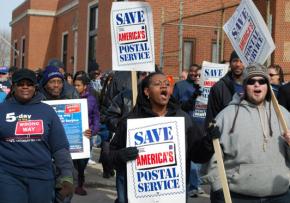A day to defend postal jobs
, a retired letter carrier and organizer with Communities and Postal Workers United, reports on the call for protests against attacks on postal jobs.
THE NATIONAL Association of Letter Carriers (NALC), representing 200,000 city postal carriers, has called for a national day of action to save six-day mail delivery on March 24. People everywhere are encouraged to show up and demonstrate to the postmaster general, Congress and the president that Americans are ready to defend postal jobs and service.
The postmaster general has been on a rampage. Over the past two years, he's eliminated 60,000 well-paid, postal union jobs while closing 70 mail-processing facilities. On July 1 of last year, he announced that mail delivery would slow, effectively eliminating overnight first-class mail. Since last fall, he's eliminated 6,500 full-time postmaster positions in mostly rural post offices, closing 500 of them. One-third of the nation's post offices are up for sale, many of them historic buildings with Depression-era murals by Works Progress Administration artists.
The U.S. Postal Service (USPS) also has begun outsourcing thousands of union trucking jobs, starting in California. This winter, 99 more postal sorting facilities began the process of closing. More than 100,000 postal jobs will be eliminated and half of all processing plants will be closed by the end of the year.

The latest outrage was the announcement of the elimination of Saturday mail delivery by early August, which will lead to the cutting of another 80,000 postal jobs, mainly city and rural letter carriers.
NALC LEADERS have insisted that the March 24 rallies focus exclusively on saving Saturday mail delivery, to the exclusion of the multiple attacks on other postal workers, postal facilities and mail service. While the 100,000-strong National Rural Letter Carriers Association (NRLCA, the other letter carriers' union), is supporting the day of action, the American Postal Workers Union (APWU, which represents 200,000 inside clerks, maintenance workers and truck drivers) and the National Postal Mail Handlers (NPMH, which represents 35,000 inside laborers) have remained silent about it to date.
Facing the inaction of their national leaders and prompted by activists of the rank-and-file network Communities and Postal Workers United (CPWU), the APWU's National Presidents' Conference, meeting in Washington, D.C., on February 3, passed a resolution calling on all their union's locals and state bodies to join the NALC day of action.
CPWU urges all unions and the public to mobilize for March 24, raising all the fundamental demands: save six-day and door-to-door delivery; reverse the closures of mail plants and offices; stop the privatization of trucking; stop the sale of post offices and the delay of mail.
Together, the postal unions unite the nation's largest unionized workforce. Postal workers brought commerce to its knees in 1970 with a wildcat strike that catapulted their wages and benefits from poverty level to some of the best-compensated blue-collar jobs in the country.
The kind of unity and power wielded by postal workers during the 1970 strike will be needed to stop the death spiral of cuts and closures that is leading the USPS into union-free privatization. The union leaderships' focus on electing politicians and lobbying Congress has produced no solution to the USPS's "financial crisis."
This crisis was created by Congress itself in a 2006 mandate that drains 10 percent of the USPS budget into a 75-year pre-fund for retiree health benefits. Despite electing hundreds of "allies" to seats in Congress, the unions have been unable to secure any positive postal legislation for years. Legislation passed by the Democratic-controlled Senate last year ensured the elimination of Saturday delivery and door-to-door delivery, without ending the onerous pre-fund mandate.
In the first decades after the 1970 strike, the four unions bargained and lobbied together. Although they grew apart, the postal unions did stage a unified national day of action on September 27, 2011. Since that time, however, the APWU and NALC have been divided on legislative strategy, supporting competing amendments to postal legislation, and even calling different days of action in April 2012.
Each postal union still maintains the "right to strike" in its constitution, however. The need for direct, disruptive action in response to these new, disastrous attacks is clearly needed now more than ever.


